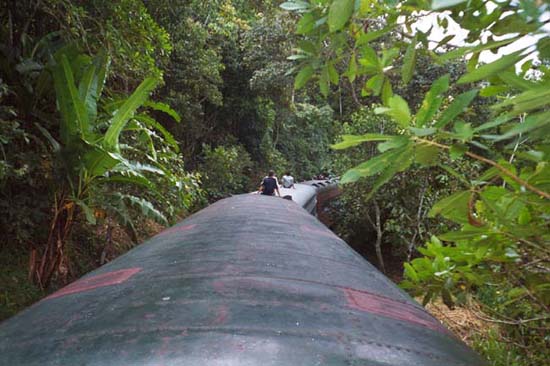
Let's kill the Americans." By Colombia RPCV Dan Looker
How we received one small early warning of danger
Farmers have a role in rebuilding the peace that must follow
dark times
E-mail Dan your thoughts at: dlooker@mdp.com.
By Dan Looker
Farm Business Editor
Let's kill the Americans." It has been 30 years since I heard those words in Spanish, spoken outside a Colombian farmhouse where my wife, Joan, and I were sleeping. It was spring in 1971. We were finishing two years as Peace Corps agricultural volunteers with Colombia's land reform agency.
I remember those words and the conversation we overheard vividly. Yet, I've told few people about the incident and have never written about it for a publication. Most of our two years in Colombia were happy and rewarding. Why distort the experience with this story?
After all, our neighbors in town, our Colombian coworkers, and the farmers we worked with had all been far more hospitable than many Americans are to foreigners. A neighbor helped Joan buy beef at the open-air market. A coworker virtually gave us his job, taking a transfer so that we replaced him as credit supervisors at our Colombian office. The poor farm families who were the agency's clients would sacrifice their last chicken for us if we arrived at dinnertime.
The work was rewarding. We organized the building of rural schools. I showed how to vaccinate cattle and use a backpack herbicide sprayer. Joan taught literacy, and oversaw loans to women for small livestock projects and cottage industries.
Each week, we spent several days visiting farms on horseback, with a hammock tied behind the saddle like a bedroll. When we arrived at a grass-thatched hut at sundown, we'd string up our hammocks and spend the night. Except that our farmer friends had battery-powered radios, it was like riding into the 1840s in the U.S. Some families asked us to be godparents of their children. It was a heck of a lot of fun.
The awful relevance of an early warning
Or it was until that evening when we missed the last bus to town and spent the night in a trailhead farmhouse. We knew that some Colombians thought Peace Corps volunteers worked for the CIA. When we visited college towns, students shouted insults. A month earlier, communist guerrillas raided a hacienda nearby and almost killed the owner.
The night we missed the bus and stayed in that farmhouse, our hostess handed me a revolver before we hung up our hammocks. "You might need this if we're robbed," she said. At about midnight, Joan awoke me. "Listen," she whispered. And for the next hour, we heard a group of highway construction workers who were drinking in a gazebo across the trail from the house. They were debating whether or not to rush the house and shoot us. They did not, and after a few hours of fitful sleep, we caught the 6 a.m. bus to town. It all could have been a ruse, but our Colombian friends in town didn't think so. We left our site a few weeks early. We had learned just how much a few people outside of the U.S. hate Americans.
Now you know, too, after the infinitely more horrible awakening of September 11, 2001. To tell this story before then might have seemed irrelevant or alarmist. Today it is a barely significant confirmation of the same horrible truth.
How farmers fit in these times
The terror of September 11 changed America and the world. Like you, I struggle to understand how it affects agriculture. There is the obvious shift of government funds from butter to guns. Both the White House and the Senate appear ready to make big changes in farm policy. Money for farms will be scarce.
Beyond that, I still believe that most people on the planet don't hate us. And that farmers everywhere have a role in rebuilding the peace that must follow these dark times. In Colombia, those who treated two idealistic young Peace Corps volunteers with the most kindness and generosity were the poorest of farmers. In the U.S., I know many farmers who work to improve international understanding -- by joining church missions, promoting trade, or welcoming foreign visitors to their farms. Some joined the Peace Corps.
Now as we enter a season of war, we cannot retreat from understanding the rest of the world. Our enemies spoke our language and used our technology against us. How many of us can read even one word of their Arabic language? America is a great nation, the bulwark of civilization and decency. If that civilization is to survive, we must better understand both our enemies and our friends abroad -- and even travel, carefully, abroad. I was glad to be able return to Colombia (a major U.S. corn buyer) briefly in 1997.
We will prevail. Terror will one day be contained. But we cannot bomb away hatred, any more than we can eradicate all weeds with one chemical. There will be "escapes." To make a safer world, our farmers and our nation must work to assure that all of the planet's children are fed well -- with nutritious food and a diet of love, not hate.
Join a discussion in @griculture Online's Farm Business discussion group or contact Dan at dlooker@mdp.com.
